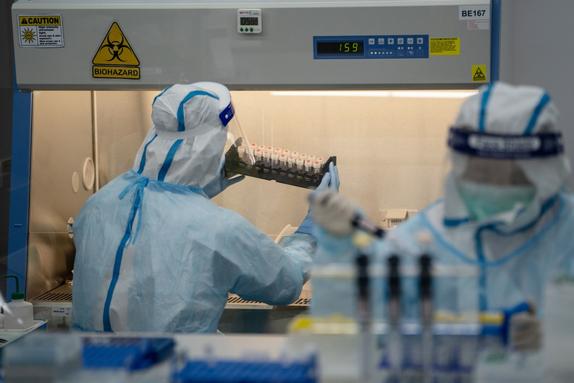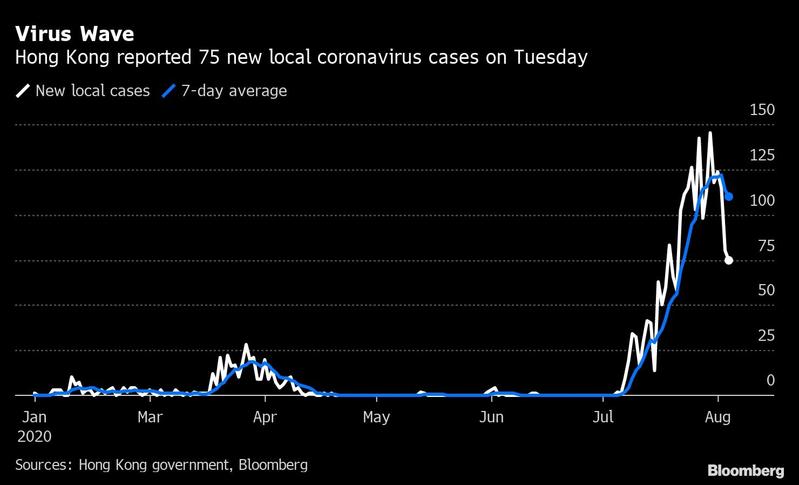 A lab technician wearing a protective suit, left, handles saliva samples for RT-PCR COVID-19 testing at Prenetics Ltd's laboratory in Hong Kong on July 31, 2020. (PHOTO/BLOOMBERG)
A lab technician wearing a protective suit, left, handles saliva samples for RT-PCR COVID-19 testing at Prenetics Ltd's laboratory in Hong Kong on July 31, 2020. (PHOTO/BLOOMBERG)
The mainland's medical testing team aims to boost coronavirus testing capacity of the Hong Kong Special Administrative Region (HKSAR) to 20 times its current ability, said the leader of a support team sent from Guangdong province to aid the city in its worst outbreak ever.
READ MORE: Mass testing & cabin hospital in HK: A helping hand from the mainland
The mainland testing team of about 60 people will work with the HKSAR government and three mainland testing companies to process 100,000 to 200,000 samples every day, said Yu Dewen in a state media video interview released on Monday.

“Our main mission is to help the Hong Kong government conduct testing on a large scale for the population,” said Yu, who is an official with Guangdong’s health commission. Yu also led the Guangdong delegation earlier sent to help Wuhan.
ALSO READ: Mainland experts to help boost SAR test efficiency
“Hong Kong’s public institutions can only run about 10,000 tests a day, which is far from enough to meet the needs of epidemic prevention,” he said.
Hong Kong’s public institutions can only run about 10,000 tests a day, which is far from enough to meet the needs of epidemic prevention.
Yu Dewen, leader of support team from Guangdong
The Asian financial center has been battling a fierce resurgence over the past month and its health-care infrastructure and testing capacity has quickly come under strain, with isolation beds and wards in public hospitals nearing their limits. The death toll in Hong Kong has also jumped as the new wave infects older people compared to previous outbreaks.
Hong Kong reported 80 coronavirus cases on Tuesday, including five imported, bringing the city's infection tally to 3,669.
ALSO READ: Home learning in new school year as toll climbs, cases drop
The virus claimed four more elderly patients, taking the fatalities in the city to 42.
The city saw a 12-day streak of triple-digit increase in daily local infections that ended only Monday. The number of locally transmitted cases further dropped to 75 on Tuesday from 80 on Monday. About half of the new local cases -- 32 -- are of unknown origins.
Virus wave
Data from the government show that city authorities have performed around 250,000 tests over the first 28 days of July, averaging less than 9,000 daily. Other places facing resurgences, like the Australian state of Victoria, are testing at over twice that pace.
Yu said that the mainland team would work with the Hong Kong branches of three mainland laboratories - BGI Genomics Co, Guangdong Hybribio Biotech Co and Guangzhou Kingmed Diagnostics Group Co.
The Chinese mainland has built up an enormous testing capacity -- officials said the nation can process nearly 4 million samples daily now -- and has used rapid testing to curb resurgences in Wuhan, Beijing and the northeastern city of Dalian.
“We have a lot of experience in large-scale testing from the mainland. We shared our experience with Hong Kong,” said Yu. “We supported Wuhan, supported Beijing. We are very confident we can finish this task nicely.”
Meanwhile, Hong Kong's Transport Department said its voluntary COVID-19 testing service for taxi and public light bus drivers will be extended starting from Tuesday.
READ MORE: Virus spread slows down in Hong Kong
In this phase of testing, drivers will take the swap samples themselves.
Drivers may visit one of the six designated distribution points to register and collect the testing kit and return the specimens to the collection points. No prior phone booking is required and the testing is free of charge.
As of 9 am Tuesday, 2,141 patients with confirmed infection have been discharged from hospitals after recovery, while 1,298 patients are hospitalized, including 43 in critical condition and 52 in serious condition.
The current occupancy rates of negative pressure rooms and isolation beds in public hospitals are 79 percent and 77 percent respectively, according to Lau Ka-hin, a chief manager of Hong Kong's Hospital Authority at the briefing.
In view of several confirmed cases found related to two food markets in Kowloon, the Food and Environmental Hygiene Department announced to strengthen cleaning and disinfection in the markets, and urged business owners in the markets to receive nucleic acid test for COVID-19 and wear masks while working.
With inputs from Agencies


